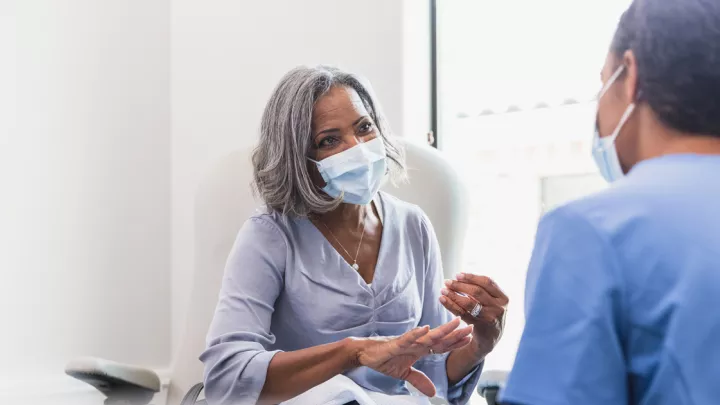PCOS: what it is and why it increases the risk of COVID-19

Some women have polycystic ovarian syndrome (PCOS) and don't even know it.
"A lot of people have never heard of PCOS," OB-GYN Karen Carlson, MD, says. "But PCOS is the most common cause of infertility due to ovulatory abnormalities."
What does PCOS look like?
PCOS can be tricky to uncover, because two women with PCOS can have vastly different symptoms and experiences. "Women with PCOS can have a spectrum of symptoms," explains Dr. Carlson. "Practically speaking, we take a personalized approach to each patient, by treating the symptoms that are bothersome."
Common symptoms that may point to PCOS include:
- Excessive hair growth (hirsutism) on chin and upper lip
- Thinning hair and hair loss from the head (temporal regions)
- Obesity
- Acne
- Irregular periods or no periods at all
- Insulin resistance or diabetes
Several PCOS symptoms are caused by increased levels of hormones called androgens. Androgen hormones are present in both women and men but are generally higher in men. Increased androgens in women can cause excessive hair growth, especially on the upper lip, chin, chest and back.
The link between COVID-19 and PCOS
PCOS has strong ties to conditions that put people at higher risk for severe COVID-19. "Women with PCOS are more prone to have other comorbidities, like obesity, diabetes and heart disease," says Dr. Carlson. These comorbidities can increase the risk of severe COVID-19.
One U.K. study found that women with PCOS have a 51% increased risk for COVID-19 infection, compared to women their age who did not have PCOS.
But the researchers wanted to know if overlapping comorbidities, or something about PCOS itself, was the reason for the increased risk.
After adjusting for risk factors – like age, BMI, hypertension and cardiovascular disease – a woman with PCOS still had a 28% higher risk of COVID-19 infection, according to the study.
Why exactly PCOS and COVID-19 can be linked is still a mystery. "We know PCOS is associated with chronic inflammation and increased cytokines," says Dr. Carlson. Likewise, an inflammatory overreaction called a "cytokine storm" can cause long-lasting damage in COVID-19 patients.
Additionally, hormonal imbalance is a key PCOS feature. It's possible that excess androgens and insulin resistance are affecting the immune system's ability to fight off viral infections like COVID-19. More research is needed to understand how having PCOS can affect outcomes like COVID-19 infection and disease severity.
While researchers continue to tease out the underlying causes of worse COVID-19 illness, it's a good idea to stay safe in the meantime. To adapt Benjamin Franklin's famous saying, an ounce of COVID-19 prevention is worth a pound of cure. A COVID-19 vaccine is a safe, effective way to prevent severe outcomes, like hospitalization and death.
How to treat PCOS
There's no way to "cure" PCOS, but treatments and lifestyle changes can manage the symptoms. For example, hormonal birth control pills, topical creams and oral medications may help reduce abnormal hair growth.
"The bottom line is, we want to know what symptoms are bothering you," says Dr. Carlson. "And then we'll do what we can to fix them."
If you want to get pregnant, PCOS can lower fertility, although some women with PCOS can get pregnant without medical assistance. Medications can help here, so see your doctor if you're trying to conceive.
Call 800.922.0000 to schedule an appointment with an OB-GYN.






